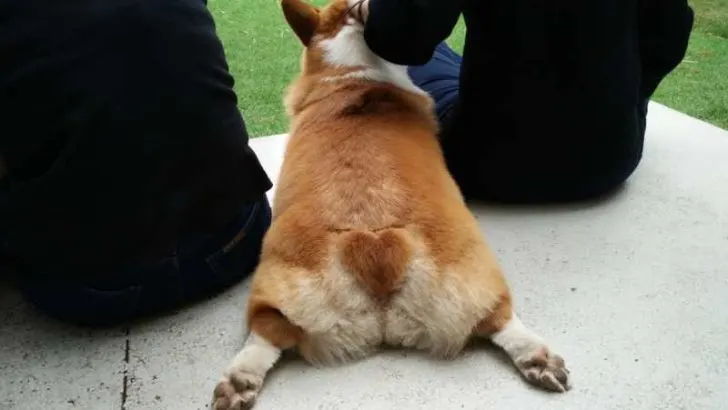Does your Corgi tend to lay down in a manner different from other dogs you’ve encountered? Does it tend to stretch out its front and back legs pointing in either direction? Chances are your Corgi is splooting!
But why do Corgis sploot?
The short answer is – it helps them relax and stretch out. And it looks oh-so-cute. As for the long answer, you’ll find it in this article. Other than looking adorable, splooting has several benefits for your Corgi. But in some cases, it could be cause for concern, too.
With that being said, let’s talk about what splooting is and why Corgis do it. Also, I will outline a few possible conditions that may be hiding behind the stretch.
Let’s take a look.
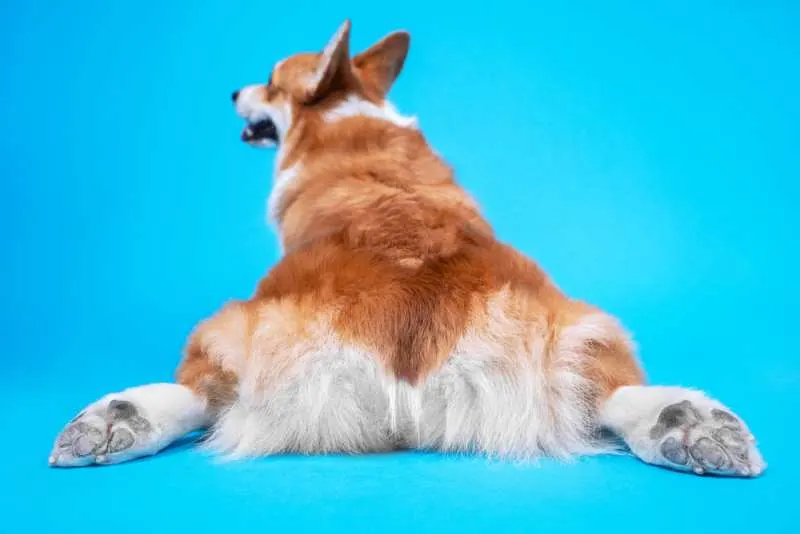
What Is Splooting?
The so-called sploot is the act of a dog lying on its stomach with its legs stretched out. Rather than tucking in their legs underneath them, they let their legs fly out. When you catch your pup in this position, they can look absolutely adorable!
Corgis are a breed that popularised this kind of a stretch. Since a lot of photos went viral on Instagram with splooting Corgis, people started using the term “Corgi sploot.”
All dogs can sploot, but not all of them are prone to it. Because of the deep type of stretch involved in splooting, not all breeds have the suitable bone structure or the flexibility needed to make it comfortable.
Being more agile and mobile than adults, puppies tend to sploot more. Over time, your Corgi may stop splooting as they find a more comfortable way to lie. The sploot has several variations:
- The side sploot, back legs are placed on one side;
- The back sploot, one back leg is extended;
- The upside-down sploot;
- The pancake sploot, all four legs are fully extended.
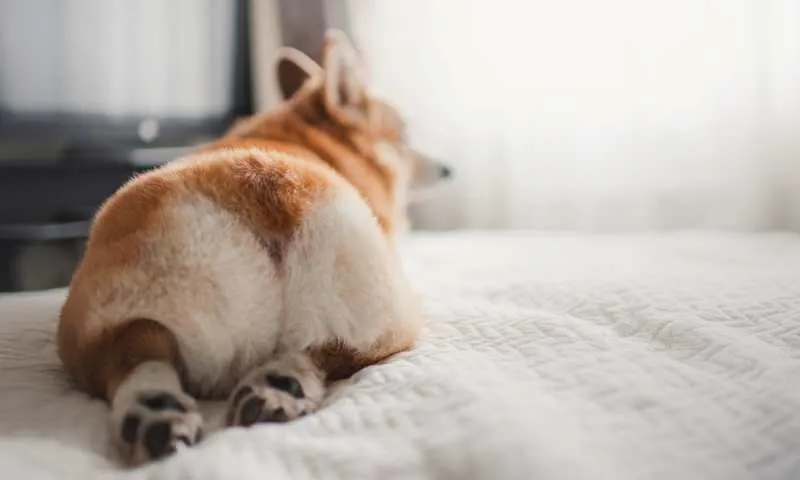
The Corgi Sploot: Why Do They Do It?
There is actually no scientific evidence that pinpoints the exact reason behind this adorable resting position. While the position may appear uncomfortable to humans, the sploot can be beneficial to your pup in many ways.
In the following section, I’ll share some common reasons why your Corgi may sploot:
Cooling Down
Have you seen your Corgi lay down on a cool tile floor? Or maybe under a shady spot in your backyard on a hot, sunny day? Splooting like that doesn’t happen by chance:
Just like many animals, Corgis control a lot of their heat from the core of their body. Lying on their tummy can help them lower their body temperature.
So by trying to get their bellies on the floor, they will begin to stretch until they are splooting. By doing so, their bodies are touching the colder surface, which allows them to manage their body temperature.
Stretching
Everyone loves that long-awaited feeling you get from stretching after being static for a while. Corgis are no exception. And what could be more chill than stretching while lying down?
Stretching is probably the number one reason why a Corgi might sploot. It alleviates any joint or muscle soreness that could build up due to their legs being curled up all day.
The pancake sploot really gives your Corgi the ultimate stretch. That doesn’t necessarily mean they don’t benefit from stretching when one leg is tucked under or turned on the side. Corgis stretch daily, whether it’s the sploot or any other stretching position.
Attention Seeking
Think about it; which dog doesn’t enjoy receiving attention? Whether it’s scratching, petting, or just talking to them, dogs love getting attention from their owners!
The odds are, your dog has figured out ways that can get your attention. Your Corgi might be splooting because they know that the sploot tends to get a reaction from you. Dogs are aware that they look adorable when they sploot, and they’ll use that to their advantage.
Youthfulness
Your dog might do the sploot simply because they are young, meaning they are flexible and enjoy stretching a lot. Corgi can get used to splooting from an early age. If your pup’s body adapts to it while young, your Corgi could make a life-long habit out of it.
Relaxation
Some people like to lie on their back, others on their side or belly when they sleep. Corgis have their own preferences as well.
Splooting is incredibly comfortable for Corgis. It provides relief and can relax their bodies. If your Corgi is splooting, that means they are enjoying it!
Another potential reason why Corgis find splooting so relaxing is that they’re prone to hip dysplasia. In that case, splooting can relieve tension and pressure and open up their hips. I’ll talk more about this condition later on.
Strengthen Hip
Much like people practicing yoga or doing other forms of flexibility and strength training, Corgis might choose splooting as a way to improve their strength and flexibility. In fact, splooting can strengthen their hip flexors significantly. Fun fact, the sploot may resemble a yoga pose as well!
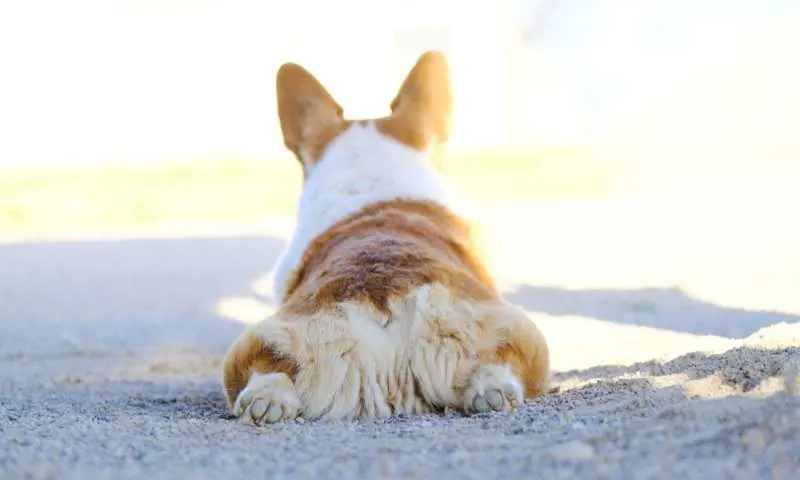
Potential Risks
The so-called sploot position usually isn’t a cause for concern. Your Corgi could be doing it for one of the above-explained reasons. And maybe your pup is just being goofy because – why not?
Nevertheless, if your Corgi suddenly starts doing the sploot all the time, you might want to look into the potential cause. The same goes for dogs that appear uncomfortable or like they’re in pain; splooting could be their way of easing the discomfort.
For instance, a dog that suddenly starts to lay down in such a manner might be suffering from:
Injury
Splooting in itself isn’t necessarily a sign of injury, but other physical symptoms, including stiffness or limping, might be. Be sure to check for cuts, wounds, or anomalies they may be hiding from you. If you suspect injury or trauma and your dog’s showing signs of discomfort, contacting your local vet is strongly advised.
Hip Dysplasia
These two words terrify dog owners. This painful condition can drastically reduce a dog’s quality of life.
Hip dysplasia is a fairly common canine condition that can occur in any size or breed of dog. Several factors lead to the development of this condition, beginning with genetics. Improper nutrition can also influence a dog’s chances of developing hip dysplasia. Too much – or too little – exercise can be a contributing factor, too.
Hip dysplasia symptoms may vary depending on the severity of the disease, the degree of looseness in the joint, the level of inflammation, and so on.
There are several symptoms of hip dysplasia that owners should be aware of:
- Decreased activity
- Pain
- Lameness in the hind end
- Loss of thigh muscle mass
- “Bunny hopping”
- Stiffness
- Grating in the joint during movement
If you suspect your Corgi has hip dysplasia, I strongly recommend contacting your local vet for further instructions and treatment.
Arthritis
Arthritis is common in older dogs, and they usually don’t show the pain until it’s severe. Since dogs have four limbs to work with, they often cope by shifting the weight from one leg to another. Another way is changing their posture, which may include splooting.
Symptoms of arthritis may be:
- Stiffness
- Difficulty climbing and jumping
- Sudden changes in willingness to walk or exercise
Skin Issues
Corgis may sploot and drag their itching belly across the ground surface. If that’s suspected, you should check for inflammation, strange bumps, scaling skin, or redness on their belly area.
Lethargy
Usually, it’s difficult to tell if a dog is lethargic or just being lazy. And the fact that lethargy can be a symptom of a variety of ailments doesn’t help, either. Symptoms that include lethargy are:
- Lack of energy
- Lack of interest in regular activities
- Slow reactions to sensory stimulation
If your Corgi demonstrates any of these, you should take it to a veterinarian. Lethargy can indicate an underlying condition, including depression, infection, and even life-threatening illnesses.
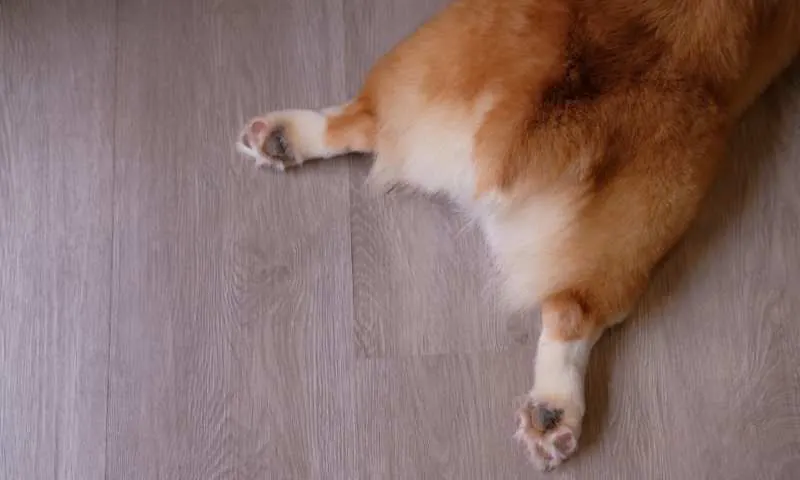
Conclusion
So, to sum it up, why do Corgis sploot? The answer is simple enough:
Probably because they want to cool down, relax, and stretch out a bit. It seems to be an individual preference, like sleep positions in humans.
On that note, Corgis are far from the only dog breed that sploot. However, one could argue that it looks the cutest on them because of the way it brings out their lower bodies’ heart shape!
While splooting is most common in younger pups, adult dogs can find it comfortable, too. In most cases, splooting is no cause for concern. In fact, it helps with flexibility and keeps their hip muscles open.
If your Corgi starts to sploot all of a sudden but hasn’t done so before, it could indicate an underlying condition. Otherwise, let your pup get comfy – and remember to snap some pics!

